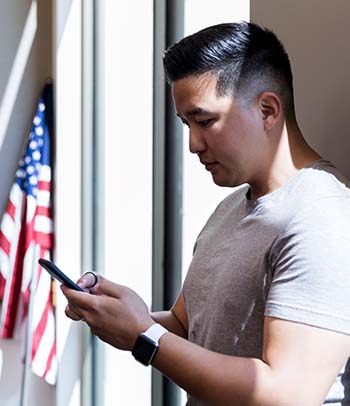Mental health problems are common in the United States, affecting tens of millions of people each year. Mental illnesses include many different conditions that vary in degree of severity, ranging from mild to moderate to severe. You probably know someone with a mental health challenge and don’t even realize it because many people experiencing these problems are highly active and productive members of our communities. Just as with certain physical health conditions, those affected might look perfectly healthy on the outside but are suffering within.
The National Institute of Mental Health estimates that only half of people with mental illnesses receive treatment. Mental health problems are not caused by weakness or character flaws, and most people need help to get better. Some common factors that contribute to mental health challenges include:
- Biological factors, such as genes, physical illness, injury or brain chemistry
- Life experiences, such as trauma or a history of abuse
- Family history of mental health problems
Veterans With Mental Health Care Needs
 The Department of Veterans Affairs (VA) is committed to partnering with Veterans and providing a wide range of recovery-oriented mental health services. The goal is to support recovery and enable Veterans who experience mental health problems to live meaningful lives in their communities and achieve their full potential, whether they have just returned from the battlefront or are experiencing new challenges brought on by everyday life. These services are available in VA’s mental health specialty clinics, primary care clinics, nursing homes and residential care facilities.
The Department of Veterans Affairs (VA) is committed to partnering with Veterans and providing a wide range of recovery-oriented mental health services. The goal is to support recovery and enable Veterans who experience mental health problems to live meaningful lives in their communities and achieve their full potential, whether they have just returned from the battlefront or are experiencing new challenges brought on by everyday life. These services are available in VA’s mental health specialty clinics, primary care clinics, nursing homes and residential care facilities.
The Department of Veterans Affairs is committed to partnering with Veterans and providing a wide range of recovery-oriented mental health services.
The number of Veterans seeking mental health care services through VA has been steadily rising since 2005. Campaigns to reduce the stigma associated with mental health and seeking treatment have been effective in reaching Veterans, resulting in them getting the care they need. VA promotes the idea that having a healthy body, satisfying work and supportive family and friends are integral to mental health. It’s important for Veterans to know that the experience of stress as a result of their combat-related military service is normal. Seeking mental health support is not only productive for Veterans, but also for their families, friends, coworkers and neighbors.
Through VA, Veterans receive treatment and support for mental health conditions like post-traumatic stress disorder, the effects of military sexual trauma, depression, grief, substance use problems and anxiety-related conditions. To learn more about common mental health conditions, including symptoms, causes and treatments, explore VA’s mental health website.
How Can Veterans Access Mental Health Care?
Veterans can get immediate help, including emergency care, for mental health issues—no matter their discharge status, service history or eligibility for VA health care—by calling or walking into any VA medical center anytime, day or night. Or call or walk into any Vet Center during clinic hours. Vet Centers are community-based counseling centers that provide a wide range of social and psychological services.
Veterans enrolled in VA health care have access to VA’s full range of health care services, including mental health care. For Veterans not enrolled in VA health care, some mental health services are available, but costs may vary. For example, regardless of disability claim or enrollment status, community-based Vet Centers offer free individual and group counseling for Veterans and their families, if the Veteran served in a combat zone or area of hostility or served as part of a mortuary affairs or drone crew. Vet Centers also provide counseling for survivors of military sexual trauma and their families, regardless of when or where the Veteran served and may provide other services, such as:
- Readjustment counseling
- VA benefits assistance
- Grief counseling
- Employment counseling
- Substance abuse assessment and referral
 If you are already using VA medical services, and you’d like to schedule your first appointment with a mental health provider, ask your primary care provider to help you make an appointment. If you’re not already using VA medical services, contact your nearest VA medical center or Vet Center to talk about your needs. Or call the VA hotline at 800-827-1000, Monday-Friday, 8 a.m.-9 p.m. ET, to find out what your care options may be. VA’s Telehealth program, which allows Veterans to talk with a mental health provider on a mobile device or through a computer, is an option for those who have difficulty visiting VA health care facilities.
If you are already using VA medical services, and you’d like to schedule your first appointment with a mental health provider, ask your primary care provider to help you make an appointment. If you’re not already using VA medical services, contact your nearest VA medical center or Vet Center to talk about your needs. Or call the VA hotline at 800-827-1000, Monday-Friday, 8 a.m.-9 p.m. ET, to find out what your care options may be. VA’s Telehealth program, which allows Veterans to talk with a mental health provider on a mobile device or through a computer, is an option for those who have difficulty visiting VA health care facilities.
VA mental health resources are also available for family members and caregivers of Veterans through Caregiver Support Coordinators—social workers and nurses with extensive knowledge of VA benefits and services. They can be reached by calling the Caregiver Support Line at 855-260-3274, Monday-Friday, 8 a.m.-8 p.m., EST, online or in person at a VA medical center.
Treatment Works
According to the U.S. Department of Health and Human Services, studies show that people with mental health problems who receive treatment, get better and many recover completely. There are more mental health treatments, services and community support systems than ever before. With the right support, many people are able to live, work, learn, participate fully in their communities and move forward with their lives.







